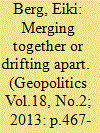| Srl | Item |
| 1 |
ID:
175117


|
|
|
|
|
| Summary/Abstract |
Under the banner of martial empiricism, we advance a distinctive set of theoretical and methodological commitments for the study of war. Previous efforts to wrestle with this most recalcitrant of phenomena have sought to ground research upon primary definitions or foundational ontologies of war. By contrast, we propose to embrace war’s incessant becoming, making its creativity, mutability and polyvalence central to our enquiry. Leaving behind the interminable quest for its essence, we embrace war as mystery. We draw on a tradition of radical empiricism to devise a conceptual and contextual mode of enquiry that can follow the processes and operations of war wherever they lead us. Moving beyond the instrumental appropriations of strategic thought and the normative strictures typical of critical approaches, martial empiricism calls for an unbounded investigation into the emergent and generative character of war. Framing the accompanying special issue, we outline three domains around which to orient future research: mobilization, design and encounter. Martial empiricism is no idle exercise in philosophical speculation. It holds the promise of a research agenda apposite to the task of fully contending with the momentous possibilities and dangers of war in our time.
|
|
|
|
|
|
|
|
|
|
|
|
|
|
|
|
| 2 |
ID:
122983


|
|
|
|
|
| Publication |
2013.
|
| Summary/Abstract |
One way to approach conflict management is to use a four-dimensional political legitimacy criterion, which could set the agenda for enhancing peace prospects in Cyprus, Moldova and Bosnia and Herzegovina (BiH). Here the argument is that through measuring the internal legitimacy of conflicting parties and then comparing and contrasting the given empirical values on the scales of cohesion/security and democracy/performance, we may be able to distinguish conflicting pairs either "merging together" or "drifting apart", depending on how the secessionist entities position themselves vis-à-vis their parent states. Empirical facts on the ground tell us that Cyprus may have the biggest chances of reunification, whereas Moldova's perspective looks meagre. The BiH, which has preserved its territorial integrity, faces real secessionist challenges, given the illegitimacy of the state and a manifest dissatisfaction with systemic deficiencies.
|
|
|
|
|
|
|
|
|
|
|
|
|
|
|
|